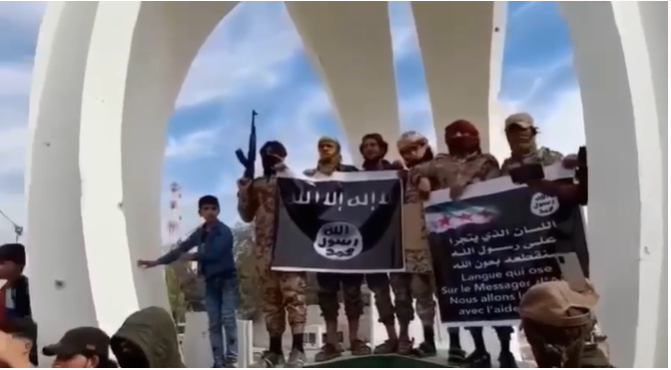(North Press) – Kidnapping, insecurity and protests went on, in October 2021, in Sere Kaniye (Ras al-Ain) and Tel Abyad, two cities northern Syria held by Turkish forces and their backed armed factions.
The latest world breaking news recently was the killing of two ISIS and al-Qaeda senior leaders by airstrikes carried out by the US forces in Syrian territories held by Turkish forces.
In late 2019, Turkish forces and their backed armed factions carried out an offensive against Sere Kaniye (Ras al-Ain) and Tel Abyad, displacing approximately 300,000 people, according to human right reports.
Turkey protects ISIS and al-Nusra leaders
While Turkey is threatening to launch a new military action against areas in northeast Syria, the US CENTCOM released a statement on October 23 announcing the assassination of al-Qaeda leader Abdulhamid al-Matar in an airstrike.
Prior to the statement, eyewitnesses told North Press they heard explosions near Arbid junction, Suluk town, 20km east of Tel Abyad.
“The removal of this al-Qaeda senior leader will disrupt the terrorist organization’s ability to further plot and carry out global attacks threatening U.S. citizens, our partners, and innocent civilians, the statement noted,” CENTCOM said.
Two days later, well-informed sources told North Press that a drone, expected to be American, targeted an ISIS senior leader identified as Sabahi al-Ibrahim al-Mesleh, nicknamed Abu Hamza al-Shuhail, in al-Edwaniya village in the countryside of Sere Kaniye.
Al-Shuhail, who hailed from Deir ez-Zor countryside, was killed with two other escorts while on duty, the sources added.
Al-Shuhail, who is a member of the Shura Council of ISIS, fled Deir ez-Zor after the Syrian Democratic Forces (SDF) took control over the entire region east of the Euphrates River in 2018, and was appointed as a leader of the Turkish-backed Division 20.
The two incidents, carried out on Turkish-held areas supposed to be a safe zone for the displaced, urged social media users to accuse Turkey of being a ‘terrorist incubator’.
In October 2020, ISIS flags were also raised in Sere Kaniye (Ras al-Ain) during a rally protesting against the French president Macron’s stances towards caricatures of the prophet Muhammad.
Late in 2020, images alleged to be Iraqi families living in Sere Kaniye (Ras al-Ain) posted on social media close to Turkish-backed armed factions, triggered controversy.
“There is evidence that these families are connected to ISIS particularly after raising ISIS flags in the protest two months ago,” media activist Orhan Kamal said at the time.
In turn, Youssef Hamoud, spokesman of the National Army factions denied that the Iraqi families have anything to do with ISIS.
Abductions go on
Abduction and arbitrary arrest of indigenous people still continue in areas held by Turkish forces and their backed factions.
On October 4, 2021, three civilians, including two women, were kidnapped by armed factions from Ali Bajaliya town, Tel Abyad, after storming their houses and threatening with the use of arms.
The factions refused the release of the abducted people despite the dignitaries appeals. This caused a public rage since the arrest of women violates the traditions and norms of the community.
On October 25, 2021, the Turkish intelligence arrested an elderly man identified as Jassem al-Sheikh, 70, from al-Tay tribe, local sources from Suluk said.
Two days later, the Turkish intelligence and their armed armed factions abducted three people from different towns on separated raids, a local source from Tel Abyad said.
Abductions mostly occur with the purpose to blackmail the families of the kidnapped and ask for a ransom.
Areas held by Turkish-backed armed factions are run by Turkish military and security branches that commit widespread violations and Turkification process, according to local and international reports.
Insecurity and protests
The security tensions between armed factions often turn to armed clashes and insecurity prevails.
For example, one quarrel between an opposition fighter and a civilian in front of a bakery in Tel Abyad in early October turned to armed fighting and resulted in the injury of three civilians one of whose injury was in the head.
In Tel Abyad, tens of armed opposition fighters in the contact lines with government forces and the SDF threatened to leave their military positions given the delay in salary payments.
A group of fighters, belonging to the Brigade 20 in Suluk area, protested in front of a Turkish military base for disrupting their payrolls.
Villages evacuated due to shelling
In the last few weeks, the Turkish forces and their backed armed factions increased the military actions in villages of Tel Tamr, Hasakah, and in Ain Issa, Raqqa, wounding civilians and causing huge material damage to properties.
In October, the Turkish forces and their backed armed factions bombarded Tel Tamr villages with mortar artillery shells for 20 times, a source from the town’s Military Council said.
Tens of houses in al-Dardara village and three other villages belonging to the Christian community were destroyed. The cemeteries belonging to the Assyrian community in Tel Jum’a and Tel Shnan villages were also damaged. In addition, the bombardment cut the power lines and damaged the infrastructure facilities in the areas.
Tel Jum’a, Tel Shnan, and Tel Keifji, villages of the Assyrian community by the Khabur River, were completely evacuated because of a recent bombardment.
Head of the Khabur Guards Council (an Autonomous Administration-allied Assyrian defense militia) said the Turkish shelling aims to evacuate the Assyrian community from the area to complete its ancient project, referring to Seyfo Massacres in 1915.
Ain Issa was also shelled more than five times in October, according to military sources from the SDF.
The shelling destroyed civilians’ houses and injured the civilian Adel Moslem, 16, while he was grazing the cattle.
The recent flare-up by Turkish forces in northeast Syria will drive the region to the worst situation and reopen the doors for terrorism, Aram Hanna, official spokesperson of the SDF stated.

